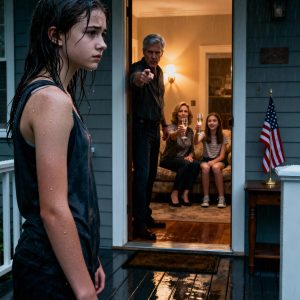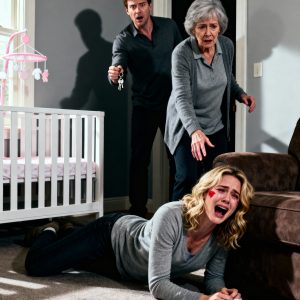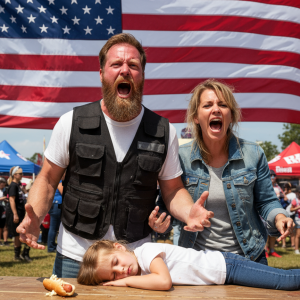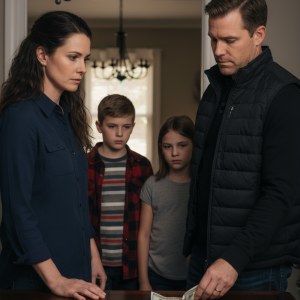Three weeks after moving in, grief still clung to me like a rain‑soaked coat. My husband was gone, the bills had swallowed our savings, and this drafty apartment was the only roof I could afford.
The street scowled at newcomers. Sirens hummed lullabies at night, and the walls spoke in angry graffiti.
That afternoon, I wrestled four grocery bags while fishing for my keys. That’s when I saw him.
He was enormous—shoulders like doorframes, arms inked with tangled stories, boots heavy as cinder blocks.
My pulse hammered. Fight or flight became more than theory.
“Everything alright, ma’am?” he asked, voice deep yet oddly gentle.
Against every instinct to stay silent, I whispered the truth. “I don’t feel safe here.”
He scanned the street like he’d memorized its dangers, then nodded once. “Most folks don’t. That’s why I walk.”
Without ceremony, he lifted one bag as if it were filled with feathers. “Let’s get you inside.”
On my porch I finally asked, “Why do you do this?”
“Because someone once walked with my mom,” he said, smile weary but warm. “Saved her. Saved me.”
Before gratitude could find my tongue, he was gone.
At dawn, I found a brown paper sack on my step: “Fresh from Miss Anita’s—start with the peach scone.”
No signature. None needed.
Over the next week, I watched him: steadying an old man’s cart, high‑fiving skater kids, separating a liquor‑store brawl with calm might.
Curiosity led me to the corner store. “Who is he?” I asked the cashier.
“That’s Marcus,” she said, ringing up my milk. “Been through fire, that one, but he holds us together.”
That night I baked the only thing I never ruin: banana bread. I brought it to the recreation center.
Marcus spotted me, laughter booming: “Busted.” He cradled the bread like treasure.
We spoke more often. He was just twenty‑eight, but carried decades. His sister, Leila, seventeen, was already filling college brochures with dreams.
One evening he arrived with a toolbox. “Your porch light’s blinking—I’ll fix it.”
While tea steeped, I realized safety isn’t always a locked door—it can be a neighbor who notices.
Then came the midnight shouting—glass shattering, a woman’s scream. My hands trembled as I called him.
“Stay inside,” he said. Moments later he stepped into the fray, calm as rain. The bottle‑wielding man backed down; the woman sobbed into his shoulder.
Next sunrise, she was on his balcony sipping coffee beside Leila.
Marcus wasn’t adding good deeds; he was rebuilding a neighborhood’s spine.
And then—he disappeared. One day, two. On the third, Leila knocked, eyes swollen. “They jumped him after class. He fought. He’s in the hospital.”
I brought banana bread and daisies. His face was bruised, arm in a sling, but that same lopsided grin greeted me.
“Guess I’m not bulletproof,” he rasped.
“Rest,” I told him. “Let us carry the weight.” The question in his eyes—Who else will?—followed me home.
So I answered. I walked Miss Clara to market. Tre, the skateboard kid, started walking dogs. Someone else painted over obscene tags.
Soon the block felt different—lighter. Not perfect, but trying.
Two months later Marcus returned, slower yet unbowed. He surveyed the changes like a gardener seeing first blooms.
“You’ve changed this place,” he said.
“No,” I smiled. “You tilled the soil. We just kept watering.”
Summer arrived, and with it our first block party—music, laughter, barbecue smoke curling skyward. Even the landlord showed, promising new lights and fresh paint.
Later, popsicle in his hand and iced tea in mine, Marcus whispered, “Mom used to say we’re here to leave things better.”
“She’d be proud,” I answered. He nodded. “We’d make her proud.”
Seasons turned. Leila started college. Tre filled out a firefighter application. The corner store window bloomed with sunflowers.
One afternoon the landlord’s office called: “We’re lowering your rent—fewer complaints, more renewals. Keep it up.”
I stepped outside to tell Marcus. The world felt wider, somehow.
“We’re hosting a sunflower‑planting workshop Saturday,” I said.
He beamed. “I’ll bring the shovels.”
Looking back, the address that once filled me with dread became the ground where I relearned hope.
Maybe the answer isn’t always running. Sometimes it’s choosing to stay and grow roots—until fear has no room left to breathe.
Because sometimes, hope doesn’t knock. It walks beside you—carrying your groceries, humming a quiet promise that things can be better.





